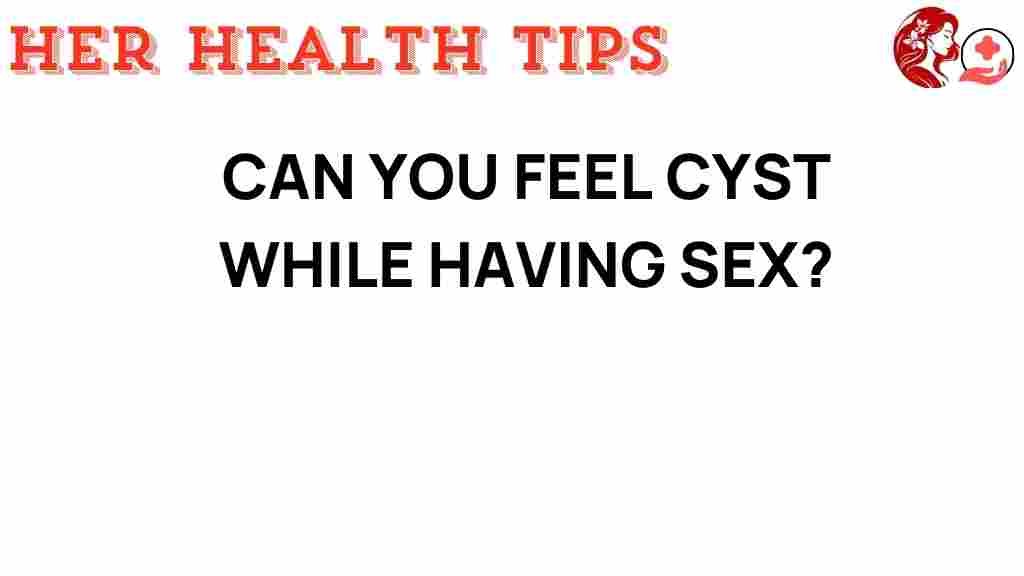The Hidden Truth: Can You Feel Cysts During Intimacy?
In the realm of women’s health, understanding the complexities of cysts, particularly ovarian cysts, is crucial for maintaining reproductive wellness. Many women wonder if they can feel these cysts during intimacy. This article delves into the connection between cysts and intimacy, exploring the symptoms, discomfort, and awareness needed for better sexual health.
Understanding Cysts and Their Symptoms
Cysts are fluid-filled sacs that can develop in various parts of the body, including the ovaries. They are often benign and may not cause noticeable symptoms. However, some women experience discomfort or pain, particularly during certain physical activities, including intimacy.
- Types of Cysts: The most common types of ovarian cysts include:
- Functional Cysts: These are related to the menstrual cycle and usually resolve on their own.
- Dermoid Cysts: These can contain hair, fat, and other tissues.
- Endometriomas: Associated with endometriosis, these cysts can cause significant pelvic pain.
- Common Symptoms: Some symptoms that may indicate the presence of cysts include:
- Pain during intimacy
- Pelvic pain or discomfort
- Irregular menstrual cycles
- Changes in bowel or bladder habits
- Nausea or vomiting in severe cases
Being aware of these symptoms is essential for maintaining sexual health and overall well-being.
Can You Feel Cysts During Intimacy?
The answer varies from person to person. Some women may feel discomfort during intimacy if they have larger cysts or specific types of cysts, such as endometriomas. Here are some factors that can influence whether a woman may feel cysts during sexual activity:
- Size of the Cyst: Larger cysts are more likely to cause discomfort.
- Location: Cysts located on or near the ovaries may lead to pain during deep penetration.
- Type of Intimacy: Certain positions may increase pressure on the pelvic area, exacerbating discomfort.
- Menstrual Cycle: Hormonal fluctuations can affect cyst size and sensitivity, especially during ovulation.
Steps to Take if You Experience Discomfort
If you experience discomfort during intimacy that you suspect may be related to cysts, consider the following steps:
- Assess Your Symptoms: Keep track of when the discomfort occurs and any accompanying symptoms.
- Consult a Healthcare Professional: Schedule an appointment with your doctor to discuss your symptoms and undergo any necessary imaging tests, such as an ultrasound.
- Consider Lifestyle Changes: Maintaining a healthy diet, managing stress, and staying active can support overall reproductive wellness.
- Explore Pain Management Options: Over-the-counter pain relief or prescription medications may help manage discomfort.
- Communicate with Your Partner: Open communication about discomfort can help both partners adjust and find comfortable alternatives.
Addressing Pelvic Pain and Cysts
Pelvic pain can often be associated with cysts and can significantly impact intimacy and sexual health. If you experience ongoing pelvic pain, consider the following:
- Identify Triggers: Keep a journal to track what activities or situations increase your pain.
- Seek Support: Consider joining support groups for women with similar experiences.
- Explore Treatment Options: Your healthcare provider may recommend hormonal treatments, lifestyle changes, or, in some cases, surgery.
Awareness and Education on Cysts
Awareness is key when it comes to managing cysts and understanding their potential impact on intimacy. Educating yourself about cyst symptoms, their causes, and treatment options can empower you to take control of your health.
Consider the following resources for further information:
Conclusion: Prioritizing Your Sexual Health and Reproductive Wellness
In conclusion, while many women may not feel cysts during intimacy, those who do experience discomfort should not ignore their symptoms. Understanding the nature of cysts and their potential impact on sexual health is crucial for women’s health. Prioritizing reproductive wellness through awareness, education, and open communication with healthcare providers and partners can lead to better health outcomes.
Always remember that your health is a priority. If you have concerns about cysts or experience discomfort during intimacy, consult with a healthcare professional who can guide you through the necessary steps for diagnosis and treatment.
This article is in the category Reproductive and created by HerHealthTips Team
